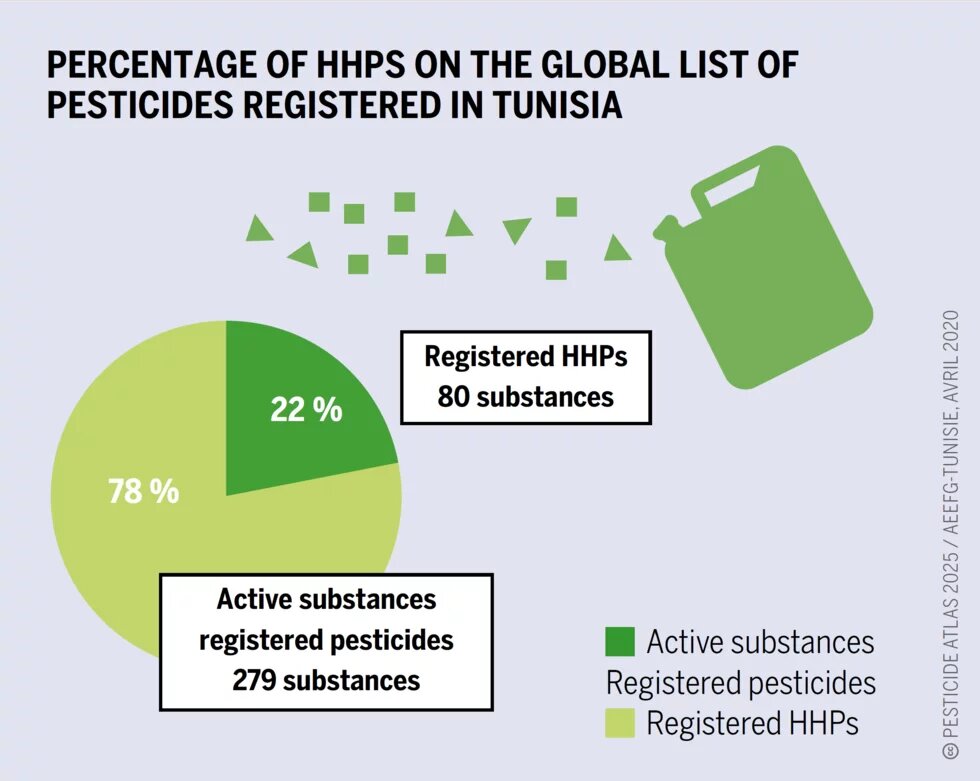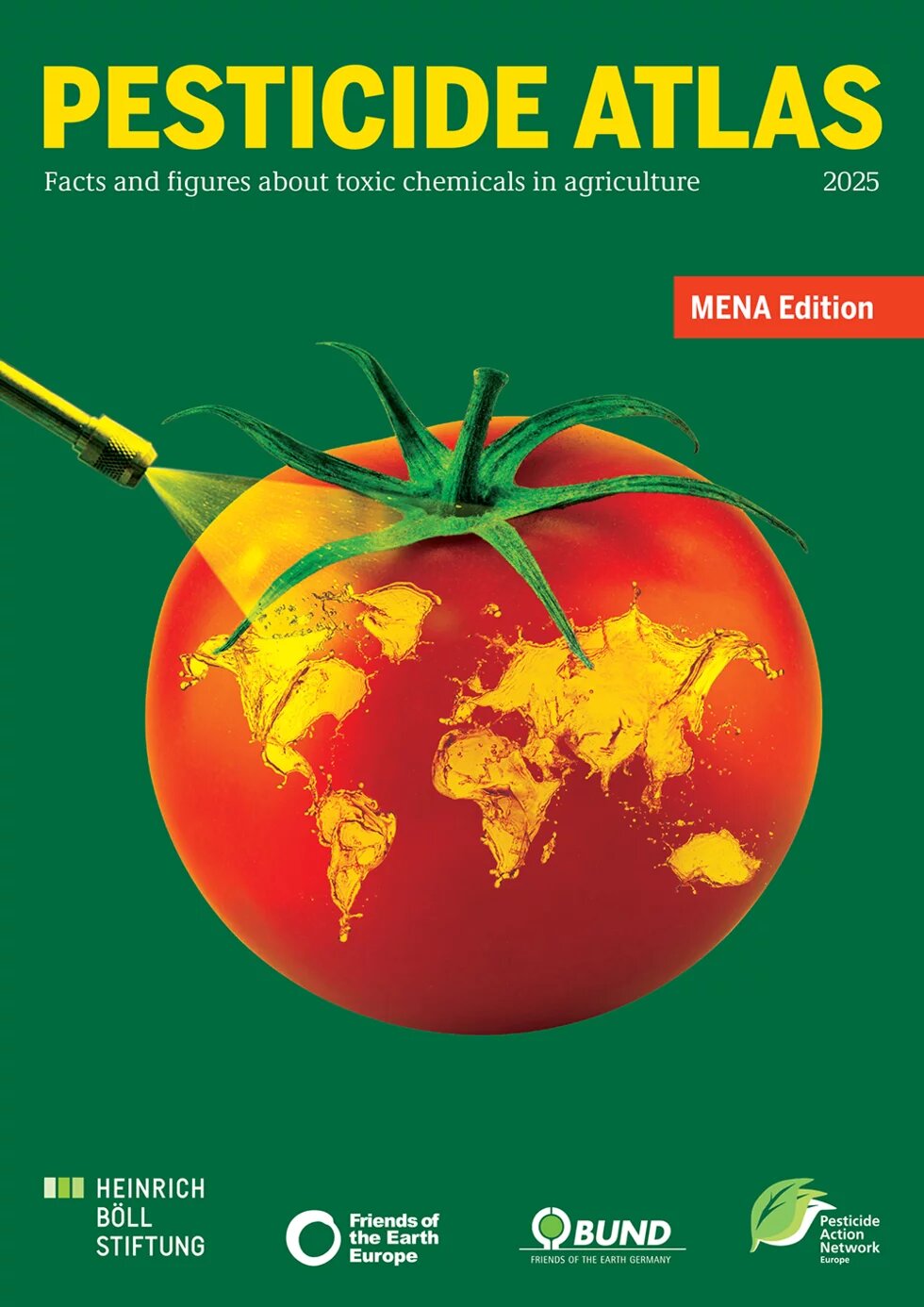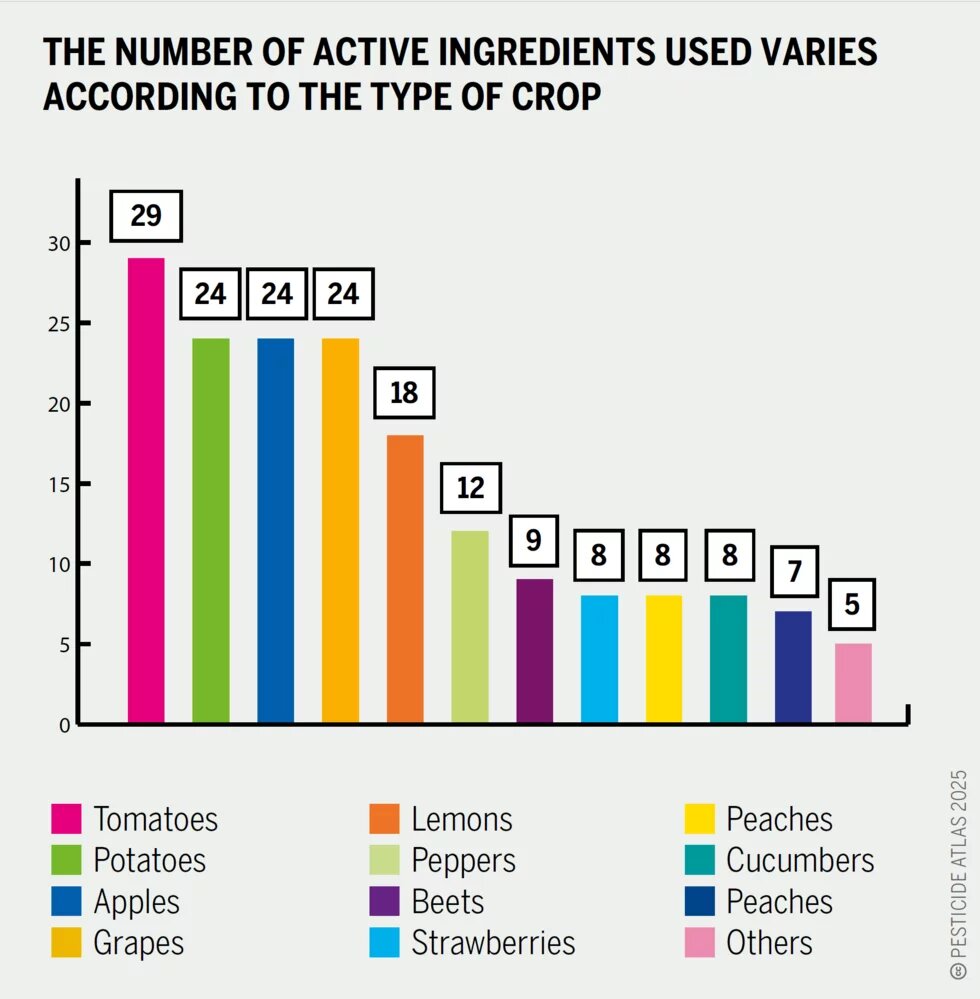
As in many countries, pesticides are widely used in Tunisia, which poses potential risks to human health and the environment. Despite their
known risks, research on pesticides use and their effects is still lacking. It is challenging to assess the extent of pesticide-related problems
in Tunisia and develop a reliable strategy to safeguard both the population and the environment.

The Main Problem
Tunisia does not produce pesticides and is totally dependent on importing them.
The use of pesticides creates significant problems and amplifies the associated risks. The report on irrigated agriculture in Tunis allows to highlight the shortcomings in pesticide control, which are mainly:
- Non-compliance with legislative texts at several levels (marketing, storage, application, residues, protection, and management of empty containers).
- Lack of adequate post-registration control procedures.
- Insufficient efforts to raise awareness and provide guidance for small and medium-sized agricultural producers and agricultural users on the risks related to pesticides and crop protection.
- The existence of black market.
Definition of Highly Hazardous Pesticides (HHPs)
High Hazardous Pesticides refer to pesticides that are known to have particularly high levels of acute or chronic health and environmental risks. In addition, HHPs also concern pesticides that may have serious or irreversible adverse effects on health or the environment under certain conditions of use in a given country, can be considered and treated as extremely dangerous pesticides.
Effects of HHPs on Health
The health risks associated with HHPs pose a direct threat to those involved in their handling, such as farmers and vendors, as well as consumers, due to the residues that remain in agricultural products and can impact people during consumption. Lethal doses (LD50) have been determined for most pesticides based on the specificities and contexts of major industrialized countries. Despite the existence of legislation, there is a difference in practices and controls in developing countries.
Thus, the term HHPs has been expanded and is now used to describe not only highly toxic pesticides but also pesticides that cause serious chronic health effects. Proving chronic health effects is usually much more difficult than demonstrating the acute toxicological effects. Chronic health effects linked to pesticides include cancers, tumors, nervous system disorders, reproductive problems, impacts on the immune system, and endocrine disorders. Moreover, children and women represent the most vulnerable population in rural areas given that the number of female farmers working in the fields is very high.
Overview of HHPs for Agricultural Use in Tunisia
Approved HHPs in Tunisia
A recent report on HHPs in Tunisia shows the percentage of HHPs among the national list. Despite the lack of data on risk assessment and the dangers of exposure to the population and users, as well as the impact on the environment in Tunisia, it can be considered that the presence and use of this significant percentage of HHPs on Tunisian territory pose exposure risks and potential dangers associated with their attributed criteria.
Let's take tomato production as an example. Tunisia has the highest production of tomato paste in the world. As a result, tomatoes are likely to be subjected to 29 types of actives substances classified as HHPs. Similarly, the number of HHPs authorized for use on potatoes is also very high Given that the Tunisian population is a major consumer of tomatoes and potatoes, there is a high risk of exposure to pesticide residues. This risk is due to both the potential daily intake of pesticide residues, and their potential bioaccumulation in the body. Additionally, the possible interaction between various substances could lead to the formation of new, more harmful molecules.
Percentage of HHPs among the total pesticides registered in Tunisia. Concerns about potential risks of exposure and risks to people and the environment.
The presence of pesticide residues further underscores the danger posed by these pesticides. One research conducted in Tunisia on grapes (which undergo numerous treatments with HHPs over three consecutive years (2015-2017) involved collecting 64 samples from various regions. It showed that these samples contained residues from 4 to 24 types of pesticides, including dithiocarbamates, with an average of 11.6 residues per sample. The individual concentrations of each pesticide ranged from 0.01 to 5.86 mg/kg.
Double Standards
Many industrialized countries, including those in Europe, have acknowledged the threats posed by HHPs and a number of other chemicals and pesticides. In response, the European Union has implemented several measures to safeguard its population and environment by banning the production and use of these substances on European territory. However, this ban does not apply to developing countries, including Tunisia, whose imports continue to come from Europe. These are double standards, which raises the question: Isn’t the value of human health equal throughout the world?
In 2018 and 2019, 240.5 tons of banned or restricted pesticides intended for agricultural use were exported from the European Union to Tunisia. Despite the European Union’s ban, 33 active substances were still be imported into Tunisia until 2021.
Tunisian Civil Society Wins the Battle Against Pesticides
Tunisian civil society has been dedicated in its efforts to advocate for toxic-free and environmentally friendly agriculture. It has worked tirelessly to bring to light the dangers of pesticides, especially HHPs, and has strongly opposed their use due to the associated health risks. At each meeting, NGOs serving on the National Pesticide Certification Committee present and explain the health effects of listed pesticides, water contamination, damage to biodiversity, ecotoxicology, and other relevant factors associated with the active ingredients being considered for approval.
The illustration shows the various ways HHPs are used on different crops in Tunisia. These practices entail health risks and threats to the population, particularly because of the high pesticide residues found in common foods like tomatoes and potatoes.
Some Tunisian journalists have also been trained in the topic of pesticides, and they in turn joined the efforts, posing questions and writing extensively about the pesticides banned in the European Union and brought into Tunisian territory. The issue of pesticides has garnered the attention of the international civil society for decades, leading to various platforms that denounce the dangers posed.
On 24 July 2023, the pressure exerted by civil society actors on the government, represented by the Ministry of Agriculture, paid off, and the use of HHPs was banned due to the danger they pose to the health of the people.
For their part, the Ministry of Environment and the Ministry of Health acknowledged the danger of HHPs, which has led to banning 33 pesticides, of which 20 are classified as HHPs, 10 are pending, and 6 are of restricted use, which only gives the ministry the right to use them upon request.
